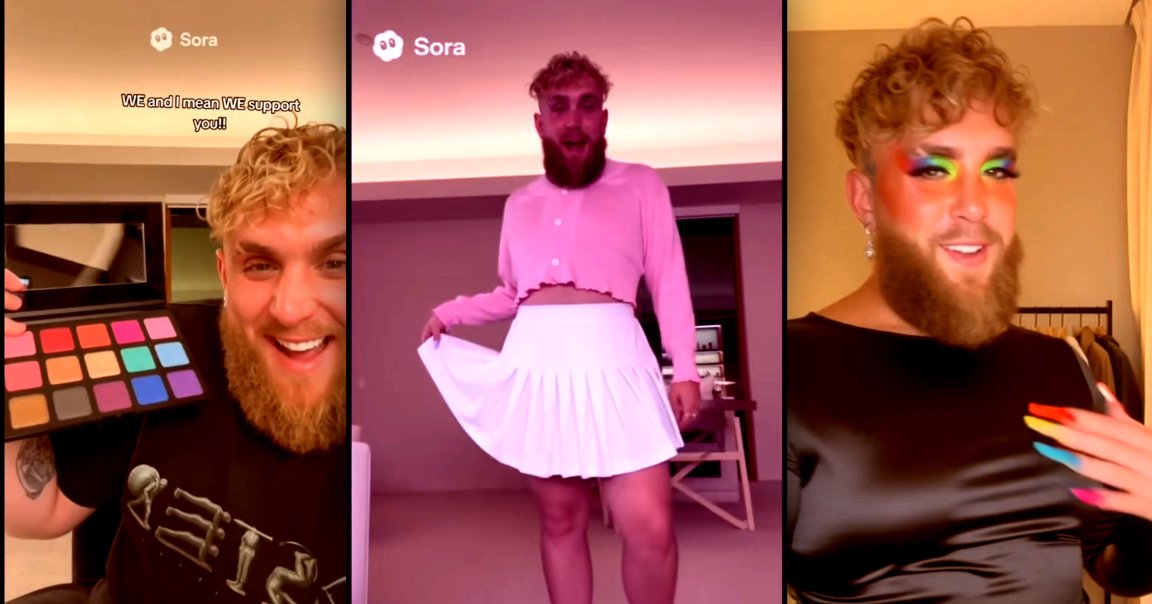
OpenAI’s recent launch of its text-to-video AI generator app, Sora 2, has already led to an enormous tidal wave of AI slop hitting internet feeds.
The company made the eyebrow-raising decision of putting deepfakes front and center of the app’s TikTok-like experience, inviting users to offer themselves up for “cameos” created by other users.
“With cameos, you can drop yourself straight into any Sora scene with remarkable fidelity after a short one-time video-and-audio recording in the app to verify your identity and capture your likeness,” the company boasted in its announcement.
And while not everybody was willing to become the butt of the joke, like OpenAI CEO Sam Altman — whose visage quickly adorned AI-generated and unnerving CCTV footage of him shoplifting or his head popping out of a toilet — some internet personalities were willing to throw themselves at the mercy of meme lords everywhere.
Influencer Jake Paul seemingly was one of them, and the results were as outlandish as you might expect. Seemingly inspired by a deepfake video of him passionately kissing upcoming UFC opponent Gervonta Davis last month, users quickly started sharing clips of him coming out of the closet and giving makeup tutorials.
Paul took the clips in stride, initially putting on a grave voice and decrying that “this AI is getting out of hand,” only to buy into the trend by acting camp in a response video posted to TikTok on Monday.
But his girlfriend, Dutch professional speed skater Jutta Leerdam, wasn’t impressed.
“I don’t like it, it’s not funny!” she told him in a video. “People believe it.”
Problematic undercurrents of homophobia aside, the trend paints a troubling picture of a future filled with photorealistic and eerily believable AI slop. The Sora app is only the latest demonstration that the tech is continuing to blur the lines between reality and a synthetic parallel universe dreamed up by generative AI.
While Paul is basking in the limelight, many netizens have watched in horror as the internet continues to be overtaken by lowbrow slop.
“Please, just stop sending me AI videos of Dad,” Zelda Williams, daughter of the late Hollywood comedy icon Robin Williams, wrote in a recent Instagram Stories post. “Stop believing I wanna see it or that I’ll understand, I don’t and I won’t.”
“AI is just badly recycling and regurgitating the past to be reconsumed,” she added. “You are taking in the Human Centipede of content, and from the very, very end of the line, all while the folks at the front laugh and laugh, consume and consume.”
Other users are finding that their faces are being used even without having opted in, like Paul, suggesting OpenAI’s “cameos” feature isn’t nearly as safe as the company makes it out to be.
“It is scary to think what AI is doing to feed my stalker’s delusions,” journalist Taylor Lorenz tweeted, revealing that her “psychotic stalker” was using Sora to generate videos of her.
Sora has also fanned the flames of a heated debate surrounding the unauthorized use of copyrighted materials, with users generating copious clips of SpongeBob SquarePants and “South Park” characters. OpenAI eventually opted to come down hard on the trend, implementing guardrails that users now say make the app “completely boring and useless.”
In the meantime, Paul’s own position seems a little ambivalent.
“I’ve had it with the AI stuff,” he said in a Wednesday video. “It’s affecting my relationships, businesses.”
“It’s really affecting things, and people really need to get a life,” he added — while haphazardly applying foundation to his cheeks using a makeup brush.
More on OpenAI: Sora 2 Has a Huge Financial Problem